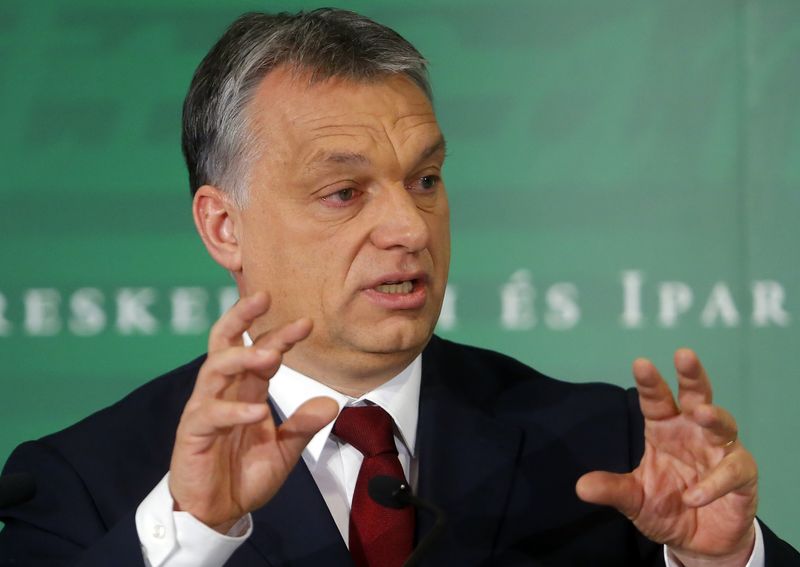By Gergely Szakacs and Krisztina Than
BUDAPEST (Reuters) -Hungarian Prime Minister Viktor Orban said on Thursday that the National Bank of Hungary's cuts to money supply were too drastic as inflation has probably peaked and price growth was driven by energy costs and sanctions on Russia.
The prime minister's comments come after the central bank said on Wednesday it would double down on a "very disciplined and tight" monetary policy after February inflation data which showed inflation still exceeding 25%.
A policy clash between Orban, who has ruled Hungary since 2010, and Governor Gyorgy Matolcsy, once dubbed by Orban as his "right hand," came to the fore on Wednesday when he voiced new criticism of the prime minister's handling of the inflation crisis.
Orban told an economic forum that such policy debates were not "abnormal."
"It is clear that the central bank wants to tackle this situation in a different way than the government," he said.
"We openly talk about this amongst each other and we will need to come to an agreement so that monetary and fiscal tools do not cancel out each other."
Last week the National Bank of Hungary left interest rates unchanged at the EU's highest level and said it would tighten liquidity conditions further, defying government pressure to cut borrowing costs amid a sharp economic slowdown.
The rift between Orban and the central bank stem in part from their differing views on the causes of the inflation crisis and projections.
Orban said that the central bank's hawkish measures would be "logical... if all inflation was of a monetary nature."
"But if the situation is that this inflation is principally due to an increase in international energy prices, and sanctions policy - at least half of it - then it is not for sure that the money supply in the economy needs to be reduced at this pace and to this extent. We need to talk about this," he said.
While Orban blames the surge in inflation largely on higher energy costs and western sanctions against Russia, Governor Gyorgy Matolcsy, Orban's former economy minister, says price growth is also fuelled by tight labour markets, very high food price inflation and strong repricing of services by companies amid resilient demand.
Average inflation in Hungary is projected to run at 16.4% this year, the highest in the European Union. Orban said on Thursday that he saw tentative signs of an improvement in inflation trends after data on Wednesday showed price growth eased marginally to an annual 25.4% in February.
However, his remarks, with the government expecting fast disinflation, appeared to be at odds with the latest view of the central bank, which warned on Wednesday that cutting inflation to single digits from over 25% would be a "tough job."
"The co-ordination of monetary and fiscal policies is under way and it will eventually happen, otherwise the horses scatter and the coach rolls into a ditch," Orban told an economic forum.
The central bank declined comment.
Economists say any escalation of the dispute could put pressure on the forint, central Europe's best-performing currency this year, which plumbed record lows versus both the euro and the dollar last October.
"Whatever the reason, any escalating conflict between government officials and the central bank can only result in more pressure on the central bank’s policies and mandate – rarely the other way round," Commerzbank (ETR:CBKG)'s Tatha Ghose said.
The NBH has warned that stronger rate hikes by core market central banks in the face of inflation being more resilient than expected also represented upside risks.

Matolcsy, once dubbed by Orban as his "right hand", said on Wednesday that Hungary's debt servicing costs would double to 4.6% of gross domestic product next year.
But Orban said on Thursday that while he saw higher debt financing costs were a big challenge, there was no imminent financing threat.